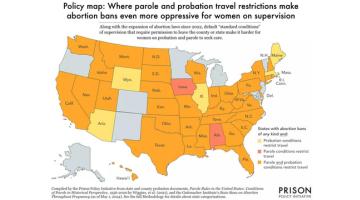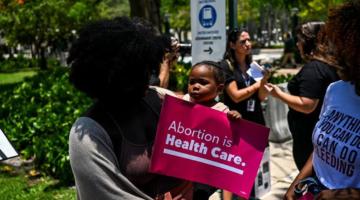How the Promise of Roe v. Wade Left Women of Color Behind
Roe has never been full of promise for women of color, immigrant women and women with low incomes, who also have the most to lose.
“Legal abortion means little to communities without the ability to access it.”
This article originally appeared in ColorLineson January 19, the anniversary of the U.S. Supreme Court decision on Roe v. Wade.
Forty-six years ago today, millions of women across the country celebrated as Roe v. Wade, which legalized abortion, was made the law of the land. No more hiding in the shadows, no more being ashamed to talk about abortion, we thought. We finally had complete control of our reproductive future and the ability to plan our families.
But the truth is, not all women have benefited from Roe. Women of color have been forced to survive in a reality without the full protections of Roe for decades.
Fake women’s health centers have blatantly targeted Black women by running misleading and offensive ads in their communities, then refusing to provide comprehensive care. Black women in California responded by drafting the Reproductive FACT Act, requiring accurate information from these fake clinics that resulted in a Supreme Court case NIFLAv. Becerra. In Indiana, Asian-American women Purvi Patel and Bei Bei Shuai were punished for their pregnancy outcomes through the state’s attempts to curtail the agency of women of color. And we can never forget Rosie Jiménez, the Latina from the Rio Grande Valley in Texas who was the first woman to die in recent years because abortion funding restrictions made it impossible for her to access safe and legal abortion care. And our government continues to deny individuals in federal custody their right to an abortion. All of these are painful reminders that legal abortion means little to communities without the ability to access it.
“Not all women have benefited from Roe.”
It is no coincidence that women of color have endured repeated humiliation, stereotypes, harassment and criminalization for simply having the courage to make decisions about our own bodies. This happens because the government has not extended the promise of Roe to our people. To pretend that it has is to ignore the lived experiences of women of color.
Lawmakers have attempted to silence women and take away our access to reproductive healthcare in a number of ways, and efforts to prohibit abortions have consistently fallen on the backs of people of color and those who live in poverty. Immediately following the Supreme Court’s ruling in Roe v. Wade, Congress passed—and continues to pass—the Hyde Amendment, which prevents federal funding from covering abortion care, automatically throwing millions of women of color on Medicaid under the bus. Representative Henry J. Hyde’s message was clear: abortion may be legal, but only if you can afford it. This is the essence of how Roe has failed us, women of color, the most. Furthermore, lawmakers have tried to use legislation to enact race selective abortion bans, which operate on dehumanizing stereotypes about people of color to push further restrictions on abortion access. Elected officials have also introduced sex-selective abortion ban legislation, which uses fearmongering and orientalism to drum up fear of immigrant communities’ alleged preference for male over female children—even though the statistics prove this is outright false.
“The Hyde Amendment, which prevents federal funding from covering abortion care.”
Laws that put healthcare out of reach are also the crux of the government’s failure to uphold Roe’s promise. More than one in four women have to travel over 30 miles to reach the nearest clinic that provides abortion services. This is all due to an increase in laws that target abortion providers and push clinics to close their doors—making it even more difficult for women, especially women of color and women with low incomes, to receive comprehensive care. With the continued closures of hundreds of clinics across the country that provide abortions, Roe, which was hardly a reality for us to begin with, is dwindling for our communities.
Over the past four decades, we have certainly made progress toward a world in which some women and girls can have agency over their bodies, lives and families. But Roe has simultaneously left many women of color behind, and even the most basic progress stands to be eroded if it is overturned.
The rollback of Roe would be devastating for all women, but women of color have the most to lose. This is best shown intersectionally: existing health disparities, lack of culturally competent care, lack of Medicaid coverage, our immigration and economic statuses, and more, play out in very real terms in our lives. In essence, our lived experiences are different—sometimes drastically so—from White women, creating varying degrees of agency over our bodies, our lives and our communities.
“More than one in four women have to travel over 30 miles to reach the nearest clinic that provides abortion services.”
Today, as we remember the significance of the Roe v. Wade decision by the Supreme Court 46 years ago, let us also remember that Roe was just the beginning of our fight. We have so much more work to do before all women can make choices about their lives and their families without discrimination, fear of stigma or criminalization. But we are taking important steps to make this a reality. For instance, among the record number of women of color now in Congress, many have been outspoken about the importance of our ability to thrive. We are counting on them to be strong, vocal and join us in demanding that the lived experiences of millions of women of color, immigrant women and low-income women are seen, understood and heard loud and clear.
Together, we can secure true agency over our lives, our families and our communities.
Sung Yeon Choimorrow is the executive director of the National Asian Pacific American Women’s Forum, the nation’s only organization dedicated to building power with Asian American Pacific Islander women and girls. You can follow her on Twitter @schoimorrow.
Marcela Howell is the president and CEO of In Our Own Voice: National Black Women’s Reproductive Justice Agenda, a national-state partnership of eight Black women’s reproductive justice organizations designed to lift up the voices of Black women leaders in the fight for reproductive health, rights and justice for all women and girls. You can follow her on Twitter @blackwomensrj.
Jessica González-Rojas is the executive director of the National Latina Institute for Reproductive Health, the only national reproductive justice organization dedicated to building Latina power to advance health, dignity and justice for Latinas and their families. You can follow her on Twitter @jgonzalez_rojas.
This article originally appeared in the January 19, 2019 ColorLines. https://ww.blackagendareport.com/donate
COMMENTS?
Please join the conversation on Black Agenda Report's Facebook page at http://facebook.com/blackagendareport
Or, you can comment by emailing us at comments@blackagendareport.com




















